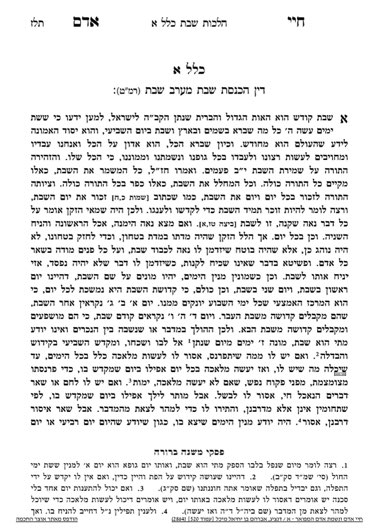We are in klal 1, continuing in siman 1 of hilchos shabbos. The Chayei Adam begins by addressing the mitzvah of zachor es yom hashabbos lekadesho.
The Chayei Adam writes that the Torah tells us zachor es yom hashabbos lekadesho, to remember shabbos to make it kadosh. The word zachor can be used in two ways. It can mean to remember, i.e., as a thought process; or it can mean to memorialize, which generally means to express it in some way. For example, regarding the mitzvah of zechiras amalek, the Gemara says that it is not enough to think thoughts about Amalek, but rather one must verbalize those thoughts (hence the laining of Parshas Zachor [see shiur 1583]). The Chayei Adam will point out that both understandings of the word zachor are applicable to Shabbos. The Chayei Adam will discuss multiple actions one should perform in fulfilling the mitzvah of zachor es yom hashabbos lekadesho.
The Chayei Adam writes that we are commanded to remember Shabbos every day. On shabbos itself, a person should clearly be aware that it is Shabbos. If a person is not aware that it is Shabbos, they may, chas veshalom, come to perform an action which is prohibited on Shabbos. The Chayei Adam adds that the mitzvah of zachor es yom hashabbos lekadesho applies throughout the week, meaning that a person should have Shabbos on the back of their mind throughout the week in order to properly prepare for Shabbos. This is the first understanding of the word zachor, that one should remember Shabbos as a thought process, in order to lead to the second understanding of zachor, to express those thoughts in some way.
The Chayei Adam brings the example of Shammai Hazakein. Throughout the week, when he would come across something nice or special, he would buy it for Shabbos. Thus, even from the beginning of the week, Shammai was already thinking about making Shabbos nice since it was on his mind. The Chayei Adam continues, and writes that when Shammai would come across something nicer, if he was unable to save both items for Shabbos, he would buy the new item for Shabbos and consume the old one during the week. Obviously, he was referring to something which would not deteriorate before Shabbos. For example, if a person likes a certain type of candy, if they find it in the store on Monday, Shammai would instruct them to buy it on Monday and save it until Shabbos. If it is something which would not last until Shabbos, such as a fruit, it would not be appropriate to save it. On the other hand, using the example of fruit, if one went to the store earlier in the week and was able to purchase something which would be saved for Shabbos, if they return to the store later in the week and find fresher fruit, it would be appropriate to purchase the fresher fruit and consume the older fruit before Shabbos.
We see that Shammai would have Shabbos on his mind, and therefore appropriately kept Shabbos because he maintained a zechira on Shabbos on his mind throughout the week.
Furthermore, the Chayei Adam points out that Shammai would verbalize his intentions by saying zo leShabbos, that the item is for Shabbos. From here, the Mishnah Berurah brings down that when one purchases an item for Shabbos, they should verbalize their intent that it is for Shabbos.
However, we see in siman 250 that it is preferred to prepare for Shabbos on Erev Shabbos, because it is more discernible that the preparations are being done for Shabbos. For example, if a person runs to the store early Friday morning, it adds to the kavod of Shabbos because people see that they are purchasing items for the purpose of Shabbos. If one purchases their items earlier in the week, it is not as clear that it is for Shabbos.
To this end, Hillel preferred to wait until Erev Shabbos to begin preparations for Shabbos. Shammai would seemingly address this issue by verbalizing his intent when purchasing something earlier in the week, so those present would recognize that the purchase was for the purpose of Shabbos.
Even if a person purchases something on Erev Shabbos for Shabbos, they should still verbalize that it is for Shabbos.
Summary
The mitzvah of zachor es yom hashabbos lekadesho teaches that one should have Shabbos in mind already from the beginning of the week.
- One way to fulfill this mitzvah is to purchase items lchavod Shabbos as they present themselves throughout the week.
- A further way of fulfilling this mitzvah is to verbalize that the purchase is for Shabbos when making the purchase.



